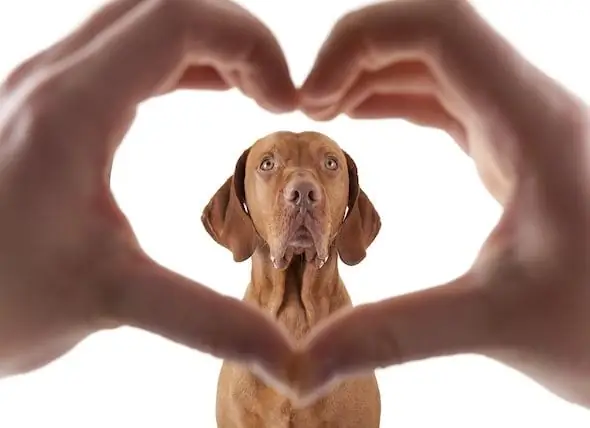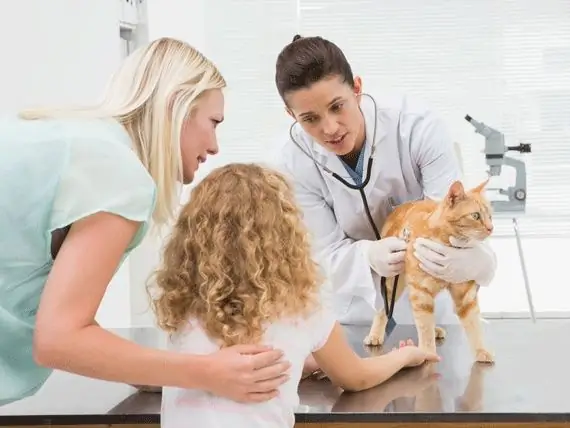
- Հեղինակ Daisy Haig haig@petsoundness.com.
- Public 2023-12-17 03:09.
- Վերջին փոփոխված 2025-01-24 12:37.
Քոթոթ գնելիս գնում եք «առողջության վկայական» ՝ նրա հետ գնալու համար: Ինչպես ցանկացած բառացի մտածող սպառող, դուք նույնպես ենթադրում եք, որ այս վերնագրով վկայական նշանակում է, որ նա անասնաբույժի կողմից հետազոտվել է և առողջության բաժնում ստացել է հաստատման կնիք:
Կրկին գուշակիր:
Անցյալ շաբաթ ես ուղարկեցի էլեկտրոնային հասցեների հոսք իմ FVMA (Ֆլորիդայի անասնաբուժական բժշկական ասոցիացիա) ցուցակ-ծառայությունից: Թեման OCVI- ների շրջանում տարածված մասնագիտական խառնաշփոթությունն էր (Անասնաբուժական ստուգման պաշտոնական սերտիֆիկատ շան կամ կատվի անշեղ վաճառքի համար): OCVI- ն `ձևը, որը կրում է« առողջության վկայական »ընդհանուր անվանումը, մեկն է այն փաստաթղթերից, որոնք շատ պետություններ պահանջում են լրացնել լիցենզավորված անասնաբույժի կողմից նախքան կենդանին վաճառվի կամ տեղափոխվի պետական գծերի վրայով:
the point of this document? to ensure animals are vaccinated and free of parasites or other infectious diseases before sale, not (contrary to popular opinion, including mine before last week) to certify the animal’s complete health.
(at least that’s how it stands in the great state of florida, given the confusion that reigns over what these documents actually mean and how ocvis are to be filled out.)
i wasn’t sure i believed this. after all, it has always seemed to me that the purpose of this form was to ensure that unscrupulous breeders and pet shops couldn’t pass on clearly defective “merchandise.” even if you could care less about animal health and welfare, it makes sense that a health certificate should certify health at the time the animal is examined-in the interest of consumer protection, at the very least.
the emails on this thread proved otherwise. indeed, several veterinarians spoke out against the ocvi as a proof of health, referencing the need to avoid legal liability in the event that a purchased pet prove chronically ill or congenitally flawed.
silly me, i thought that was the point. since we get paid to sign these documents i figured the financial remuneration was in exchange for our expertise-that is, beyond pushing a few shots, checking for kennel cough and expertly scooping stool from a rectum for analysis.
wrong!
confused, i researched this issue. and here’s what i found:
apparently, the problem of “health certification” and veterinarian resistance to the issue stems from a drive to make vets liable for congenital illnesses that manifest up to a year after purchase when they sign ocvis.
example: a pup that was normal when a vet examined him at 8 weeks. six months later he’s diagnosed with hip dysplasia. and guess what? according to this proposed interpretation of ocvis the vet is potentially liable for his treatment.
given the choice between a document that makes me liable for what i can attest to and one that requires a crystal ball for the kind of accuracy i’m willing to sign my name to, i guess i’ll elect the former any day of the week. can’t blame my fvma colleagues on that score.
but why the either/or? why can’t i simply be liable for all the problems any reasonable vet should have seen at the time the exam?
honking heart murmurs, undescended testicles, certain obvious knee and hip diseases…
don’t these congenital niceties deserve to be included among the “health” issues we need to vet as vets?
i see pet shop pups and other shipped pets with two day-old ocvis bearing obvious congenital illnesses any third-year vet student could diagnose. clearly that’s wrong. someone needs to be accountable when these conditions are given a pass. but legally, all’s fair and square if a health certificate only deals in infectious diseases. after all, most states also have pet lemon laws making it “easy” to return a defective afflicted animal within a certain period of time. no harm no foul, right?
wrong again. no animal should be sold without a veterinarian’s stamp of approval within ten days of the sale. and that should mean that the animal appears to be completely healthy at the time of the exam. any congenital abnormalities should be written on the form. anything less means no sale. no way.
responsible breeders wouldn’t dream of doing otherwise. pet shops, on the other hand, exploit all the angles. they work with vets who know the loopholes as well as they do. they even try to get prospective owners to sign lemon law waivers, passing them off easily in the pile of paperwork that attends the point of sale.
as it stands, what you consider a health certificate for that puppy in the window may mean nothing except that said pup was vaccinated, no upper respiratory symptoms were noted and that no parasites were observed on the day the pup was presented to the vet for examination. but if vets are liable for only those meager, easily refutable functions, what does that say about the entire “health certification” process?
as my former ignorance of the law clearly implies, not all vets even know what they’re signing when they complete these forms. but you can bet the ones who work for the pet shops do.
check your state’s regulations to determine what your health certificates mean. even if you’ll never purchase a pet in your lifetime, your moral compass should drive you to care about what happens to thousands of animals every day in your state/province/country.
no-health health certificates? they simply ensure that poor quality purveyors of congenitally flawed animal flesh can continue to breed animals irresponsibly, unfairly and cruelly. and that’s gotta change.
Խորհուրդ ենք տալիս:
Ուսումնասիրությունը պարզում է, որ շները ոչ միայն հասկանում են, թե ինչ ենք ասում, այլ նաև, թե ինչպես ենք դա ասում

Երբ ձեր շանը ասում եք «Լավ տղա»: երբ նա մանր է գնում ճիշտ տեղում կամ առբերում է ձեր նետած գնդակը, նա երջանիկ է թվում, որ ձեզ այդքան ուրախացրեց: Չնայած շների տերերն արդեն գիտեն, որ մեր ասած բառերը և ինչպես ասում ենք դրանք մեծ ազդեցություն ունեն մեր ընտանի կենդանիների վրա, բայց գիտությունն այժմ ապացուցում է, որ դա ճիշտ է: Այլ կերպ ասած, եթե չեզոք ձայնով ասեք «Ես քեզ սիրում եմ», քո շունը չի ունենա դրան նույն արձագանքը, կարծես դու կասես այդ նույն բառերը, բայց ավելի ուրախ տրամա
Ինչ է ասում ձեր ընտանի կենդանու միզուղին իր առողջության մասին

Մեզը ընտանի կենդանիների առողջության շատ արժեքավոր ցուցանիշ է: Իմացեք ավելին ձեր ընտանի կենդանու մեզի բնութագրերի մասին, և երբ հոտի կամ գույնի փոփոխությունները կարող են խնդիր ցույց տալ
Այն, ինչ ձեզ հարկավոր է ձեր կենդանուն քաղցկեղի վերաբերյալ հարցնելու համար

Սեփականատերերը ահռելի քանակությամբ հարցեր են տալիս իրենց ընտանի կենդանիների քաղցկեղի վերաբերյալ: Ոմանք կանխատեսելի են, ոմանք էլ ավելի առանձնահատուկ, իսկ մյուսները կարող են զարմանալիորեն զննել: Իմացեք ավելին այն մասին, թե ինչ պետք է հարցնեք ձեր անասնաբույժին
Ինչ են ձեզ ասում լաբորատոր փորձարկումները ձեր կատվի առողջության մասին

Անասնաբուժական այցելությունները կարևոր են ձեր կատվի առողջության համար: Ձեր անասնաբույժը, ամենայն հավանականությամբ, խորհուրդ կտա ձեր կատվի համար կատարել արյան և մեզի սովորական փորձարկում: Ի՞նչ կարող են ցույց տալ արյան և մեզի այս թեստերը, որ ֆիզիկական զննումը չի կարող: Այս հարցերին պատասխանում են այստեղ
Ինչպե՞ս հասկանալ, թե ինչ է ասում ձեզ ձեր նոր լակոտը

Սովորելը, թե ինչպես կարդալ ձեր նոր լակոտի մարմնի լեզուն և վարքը, նրա հետ ամուր կապ հաստատելու կարևոր մասն է
